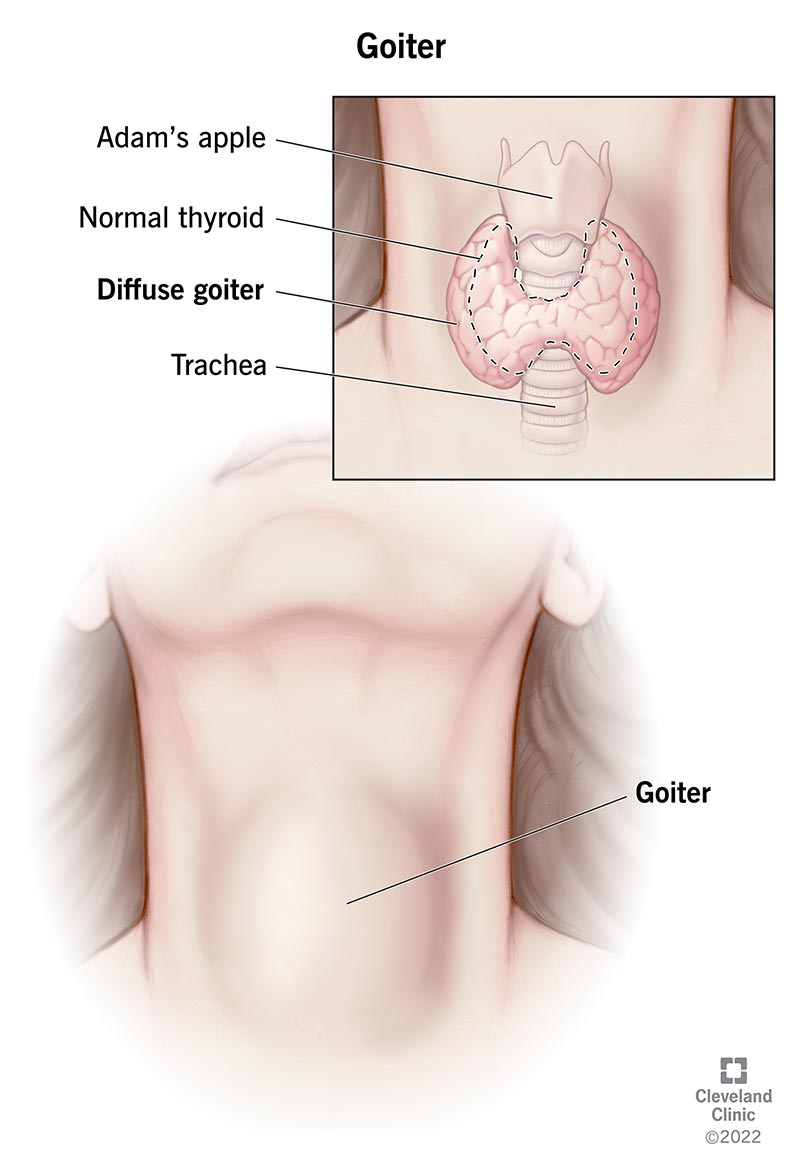Goiter happens when your thyroid gland grows larger. It has several possible causes and may or may not be associated with abnormal thyroid hormone levels. It’s treatable.
Advertisement
Cleveland Clinic is a non-profit academic medical center. Advertising on our site helps support our mission. We do not endorse non-Cleveland Clinic products or services. Policy

Goiter is a condition where your thyroid gland grows larger. Your entire thyroid can grow larger or it can develop one or more small lumps called thyroid nodules.
Advertisement
Cleveland Clinic is a non-profit academic medical center. Advertising on our site helps support our mission. We do not endorse non-Cleveland Clinic products or services. Policy
Your thyroid gland is a small, butterfly-shaped endocrine gland located in your neck, below your Adam's apple. It produces the hormones thyroxine (also called T4) and triiodothyronine (also called T3). These hormones play a role in certain bodily functions, including:
Goiter may be associated with an irregular amount of thyroid hormone in your body (hyperthyroidism or hypothyroidism) or with normal levels of thyroid hormone (euthyroid).
Goiter has several possible causes. Depending on the cause, it may or may not require treatment.
Goiter can be classified in a few different ways, including the way by which it grows and if your thyroid hormone levels are irregular or not.
Classifications for goiter based on how it enlarges include:
Advertisement
Classifications of goiter based on thyroid hormone levels include:
Healthcare providers combine these descriptors to classify certain types of goiter when diagnosing them. For example, a toxic multinodular goiter happens when there’s more than one nodule on your thyroid — usually several — producing an extra amount of thyroid hormone.
Anyone can have a goiter, but it’s about four times more likely to develop in people assigned female at birth compared to people assigned male at birth. Your risk of developing goiter also increases as you age. They’re more common after age 40.
People who have any of the following conditions may also be more likely to develop goiter:
You’re also at greater risk for developing goiter if your head and neck have been exposed to radiation for medical treatments and/or if you have a family history of thyroid disease.
Goiters are relatively common. They affect about 5% of people in the United States.
The most common cause of goiters worldwide is iodine deficiency, which affects an estimated 2.2 billion people.
The more severe the iodine deficiency, the more likely someone is to have goiter:
The size of a goiter can range from very small and barely noticeable to very large. Most goiters are painless, but if you have thyroiditis (an inflamed thyroid gland), it can be painful.
The main symptoms of goiter include:
Other, less common symptoms include:
Some people who have a goiter may also have hyperthyroidism (overactive thyroid). Symptoms of hyperthyroidism include:
Advertisement
Some people with goiter may also have hypothyroidism (underactive thyroid). Symptoms of hypothyroidism include:
Goiter is an adaptive reaction of the cells in your thyroid to any process that blocks thyroid hormone production. While the most common cause of goiter worldwide is iodine deficiency, many conditions can cause it.
Causes of goiter include:
Advertisement
Sporadic goiters, in most cases, have no known cause. In some cases, certain drugs can cause this type of goiter. For example, the drug lithium, which is used to treat certain mental health conditions, as well as other medical conditions, can cause this type of goiter.
Your healthcare provider usually diagnoses goiter when they perform a physical examination and feel that you have an enlarged thyroid. However, the presence of a goiter indicates that there’s an issue with your thyroid gland. They’ll need to figure out what the issue is.
Your provider can use several tests to diagnose and evaluate goiter, including the following:
Advertisement
A simple goiter may happen for only a short time and may go away on its own without treatment.
Many goiters, such as multinodular goiter, are associated with normal levels of thyroid hormone. These goiters usually don’t require any specific treatment after your healthcare provider has diagnosed it. However, you may be at risk of developing hypothyroidism or hyperthyroidism in the future.
If you have an enlarged thyroid gland, it’s still important to see your healthcare provider since goiters have multiple possible causes — some of which require treatment.
Treatment for goiter depends on how large your thyroid has grown, symptoms and what caused it. Treatments include:
A goiter caused by iodine deficiency (simple goiter) is generally the only type of goiter you can prevent. Consuming a diet that includes fish, dairy and a healthy amount of iodized table salt prevents these types of goiters. Iodine supplements and other supplements are generally not recommended and may do more harm than good.
The prognosis (outlook) for goiter depends on its type and what caused it.
Simple goiter has a good prognosis. If your thyroid continues to enlarge, it may compress the surrounding structures and may cause difficulty in breathing and swallowing and hoarseness.
If the goiter is a sign of another thyroid disease like Graves’ disease or Hashimoto’s disease, the prognosis depends on the underlying cause of thyroid enlargement.
Regardless of the cause, it’s important to see your healthcare provider regularly (at least annually) if you’ve been diagnosed with goiter so they can monitor it.
If you develop new symptoms, talk to your healthcare provider.
A note from Cleveland Clinic
Your thyroid is an important gland in your endocrine system that affects many aspects of your body. If it becomes enlarged, it may be a sign of an underlying thyroid disease. The good news is that goiter is treatable and sometimes goes away on its own. If you notice a lump in the front of your neck, talk to your healthcare provider. They can determine if it’s goiter and the underlying cause.
Last reviewed on 06/05/2022.
Learn more about the Health Library and our editorial process.